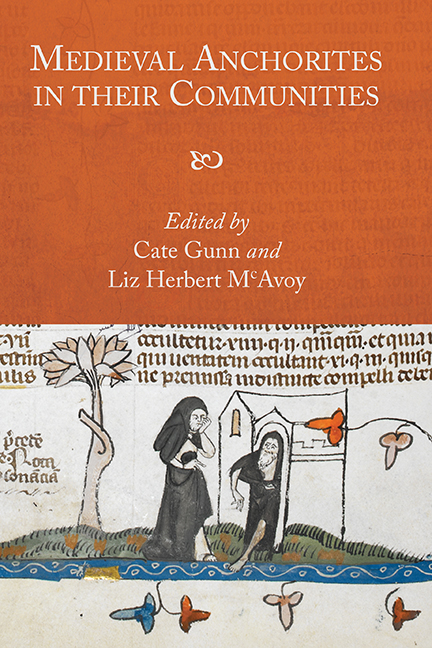Book contents
- Frontmatter
- Dedication
- Contents
- List of Illustrations
- Acknowledgements
- List of Contributors
- Abbreviations
- Introduction: ‘No Such Thing as Society?’ Solitude in Community
- 1 ‘O Sely Ankir!’
- Part I Religious Communities
- Part II Lay Communities
- Part III Textual Communities
- Bibliography
- Index
- Miscellaneous Endmatter
Introduction: ‘No Such Thing as Society?’ Solitude in Community
Published online by Cambridge University Press: 30 August 2017
- Frontmatter
- Dedication
- Contents
- List of Illustrations
- Acknowledgements
- List of Contributors
- Abbreviations
- Introduction: ‘No Such Thing as Society?’ Solitude in Community
- 1 ‘O Sely Ankir!’
- Part I Religious Communities
- Part II Lay Communities
- Part III Textual Communities
- Bibliography
- Index
- Miscellaneous Endmatter
Summary
ANCHORITES live a life in solitude. Solitude and community seem to be in opposition to one another; indeed, many early Christians withdrew from Roman society, a society founded on city life, in order to live in solitude in the desert. But this was not a total rejection of all society; as more Christians were attracted to the desert, monasteries formed, and although they remained removed from mainstream society, this withdrawal took place with the support of a community. For Cassian (d. 435), one of the first Christian ‘anchorites’, his period in the desert was a training for his vocation, which involved establishing monastic communities in France for men and women in the fifth century. In the sixth century, Benedict (d. c. 547) described anchorites as monks who, having been trained in the community, were able to pursue a solitary vocation. This type of interdependent relationship between solitaries and communities continued throughout the Middle Ages in complex and multivalent ways – as essays in this collection serve to illustrate. However, as many contemporary scholars have begun to point out, there is no impenetrable firewall between the Middle Ages and the modern period and while we inevitably study the Middle Ages through the prism of our present age, that study can also illuminate our own communities and societies.
Margaret Thatcher's infamous declaration in 1987 that ‘there is no such thing as society’ and David Cameron's more recent idea of a ‘Big Society’ suggest a continuing interest and concern with the notion of society, what it means for individuals living within – or rejected by – that society, especially in the face of the expanding and constantly evolving societies and their communities now generated by explosions in digital and communications technologies, the internet and myriad new media platforms in recent years. Every day, sizeable and world-changing global communities are being produced by countless individuals in communication with countless other individuals, whether in densely packed urban centres or remote, isolated settlements; in busy airports and internet cafes or small, single bedsits. More than ever before, or so the story goes, whilst frequently physically alone, individuals are nevertheless grouping together to form – and find strength in – new communities and societies worldwide.
- Type
- Chapter
- Information
- Medieval Anchorites in their Communities , pp. 1 - 12Publisher: Boydell & BrewerPrint publication year: 2017

